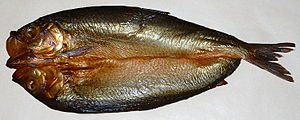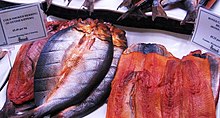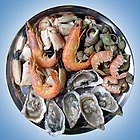Kipper
This article needs additional citations for verification. (July 2012) |
It has been suggested that Orange kipper be merged into this article. (Discuss) Proposed since July 2012. |

A kipper is a whole herring, a small, oily fish,[1] that has been split from tail to head, gutted, salted or pickled, and cold smoked.
In the United Kingdom, in Japan, and in some North American regions they are often eaten for breakfast. In the UK, kippers, along with other preserved fish such as the bloater and buckling, were also once commonly enjoyed as a high tea or supper treat; most popularly with inland and urban working-class populations before World War II.
Terminology
The English philologist and ethnographer Walter William Skeat derives the word from the Old English kippian, to spawn. The origin of the word has various parallels, such as Icelandic kippa which means "to pull, snatch" and the German word kippen which means "to tilt, to incline". Similarly, the English kipe denotes a basket used to catch fish. Another theory traces the word kipper to the kip, or small beak, that male salmon develop during the breeding season.
As a verb, "to kipper" (see kippering) means to preserve by rubbing with salt or other spices before drying in the open air or in smoke. It is also used in slang to mean being immersed in a room filled with cigarette or other tobacco smoke.
Origin
The exact origin of kippers is unknown, though fish have been slit, gutted and smoked since time immemorial.[2] According to Mark Kurlansky, "Smoked foods almost always carry with them legends about their having been created by accident—usually the peasant hung the food too close to the fire, and then, imagine his surprise the next morning when …".[3] For instance Thomas Nashe wrote in 1599 about a fisherman from Lothingland in the Great Yarmouth area who discovered smoking herring by accident.[4] Another story of the accidental invention of kipper is set in 1843, with John Woodger of Seahouses in Northumberland, when fish for processing was left overnight in a room with a smoking stove. These stories and others are known to be apocryphal because the word "kipper" long predates this. Smoking and salting of fish—in particular of spawning salmon and herring which are caught in large numbers in a short time and can be made suitable for edible storage by this practice predates 19th century Britain and indeed written history, probably going back as long as humans have been using salt to preserve food.
Preparation

"Cold smoked" fish, that have not been salted for preservation, need to be cooked before being eaten safely (they can be boiled, fried, grilled, jugged or roasted, for instance). "Kipper snacks," (see below) are precooked and may be eaten without further preparation.
In the United Kingdom, kippers are often served for breakfast[5], tea or dinner. In the United States, where kippers are less commonly eaten than in the UK, they are almost always sold as either canned "kipper snacks" or in jars found in the refrigerated foods section.
In Haiti, kipper is eaten with scrambled eggs for breakfast or mixed with pasta or rice.
Kippers in the British Isles
Kippers are produced in the Isle of Man and exported around the world.[6] Thousands are produced annually in the town of Peel, where two kipper houses, Moore's Kipper Yard (founded 1882)[6] and Devereau and Son (founded 1884),[6] smoke and export herring.
Mallaig, once the busiest herring port in Europe,[7] is famous for its traditionally smoked kippers, as well as Stornoway kippers and Loch Fyne kippers. The harbour village of Craster in Northumberland is also famed for its kippers, where they are prepared in a smokehouse, sold in the local shop and exported around the world.
Related terms

The Manx word for kipper is [skeddan jiarg] Error: {{Lang}}: text has italic markup (help) which literally translates as red herring. Compare to Irish scadán dearg.
A kipper is also sometimes referred to as a "red herring", although particularly strong curing is required to produce a truly red kipper.[8] This term can be dated to the late Middle Ages as quoted here c1400 Femina (Trin-C B.14.40) 27: "He eteþ no ffyssh But heryng red." Samuel Pepys used it in his diary entry of 28 February 1660 "Up in the morning, and had some red herrings to our breakfast, while my boot-heel was a-mending, by the same token the boy left the hole as big as it was before."[9]
Kipper time is the season in which fishing for salmon is forbidden in Great Britain, originally the period 3 May to 6 January, in the River Thames by an Act of Parliament.
Kipper season refers (particularly among fairground workers, market workers, taxi drivers and the like) to any lean period in trade, particularly the first three or four months of the year; possibly a reference to the above usage, or to the need to live frugally during such a period, by (for instance) living on kippers.
The sailors of the Royal Canadian Navy also use the term 'kippers' as a slang for members of the Royal Navy.
See also
- Bloater, whole-smoked herring
- Buckling, hot-smoked decapitated herring
- Fish preservation
- Orange kipper
- Red herring, something true but irrelevant
- Smoked fish
- Solomon Gundy
References
- ^ "What's an oily fish?". Food Standards Agency. 24 June 2004.
- ^ The practice of smoking salmon for preservation was seen by Lewis and Clark among American Indians of the Columbia River region.
- ^ Mark Kurlansky, 2002. Salt: A World History, ISBN 0-8027-1373-4
- ^ "Curing of Herrings—From the Works of Thomas Nash, 1599", The Every-day Book and Table Book; or, Everlasting Calendar of Popular Amusements, Sports, Pastimes, Ceremonies, Manners, Customs, and Events, Each of the Three Hundred and Sixty-Five Days, in Past and Present Times; Forming a Complete History of the Year, Months, and Seasons, and a Perpetual Key to the Almanac, Including Accounts of the Weather, Rules for Health and Conduct, Remarkable and Important Anecdotes, Facts, and Notices, in Chronology, Antiquities, Topography, Biography, Natural History, Art, Science, and General Literature; Derived from the Most Authentic Sources, and Valuable Original Communication, with Poetical Elucidations, for Daily Use and Diversion. Vol III., ed. William Hone, (London: 1838) p 569-70. Retrieved on 10 June 2008
- ^ Fearnley-Whittingstall, Hugh. "Hugh Fearnley-Whittingstall's herring recipes". The Guardian. Retrieved 6 May 2012.
- ^ a b c "Isle of Man". BBC. Retrieved 9 May 2012.
- ^ "Mallaig and its story". Mallaig Heritage Centre. Retrieved 9 January 2010.
- ^ Quinion, Michael (2002). "The Lure of the Red Herring". WorldWideWords. Retrieved 21 April 2007.
- ^ Pepys Samuel (1893). "The Diary of Samuel Pepys M.A. F.R.S." Samuel Pepys' Diary. Retrieved 21 February 2006.
External links
- "The lure of red herring", history of smoked fish varieties.
- History of fish smoking
- Isle of Man Kipper Museum
- National Library of Scotland: SCOTTISH SCREEN ARCHIVE (archive films relating to the production of kippers)
This article needs additional citations for verification. (July 2012) |



